
Neurodegenerative disorders (other) lay summaries
This includes all neurodegenerative disorders except Alzheimer’s Disease which has been given a separate section.
- BRAIN UK Ref: 25/004 – Fibre Types and Structural Patterns in Skeletal Muscle Development and Pathologyur muscles help us move and perform daily activities thanks to a complex process involving specific proteins, one of which is called MyHC-2X. This protein is crucial for muscle development and function, but there’s still a lot we don’t know… Read more
- BRAIN UK Ref: 24/005 – Leveraging Human Cell Atlas technologies to shed light on the immune aetiology of chronic inflammatory demyelinating polyradiculoneuropathyChronic inflammatory demyelinating polyradiculoneuropathy (CIDP) is a rare neurological condition characterised by inflammation of the patient’s peripheral nerves… Read more
- BRAIN UK Ref: 23/026 – Genome and transcriptome analysis in DRPLA, other rare repeat expansion disorders and undiagnosed inherited ataxia tissueRepeat expansion disorders are inherited disorders where the disease gene has extra base pairs inserted (usually based CAGs), such as in Huntington’s disease where the normal numbers of CAG repeats in the gene is under 36 but… Read more
- BRAIN UK Ref: 23/009 – SPCA in ALSThis project will develop a new treatment for amyotrophic lateral sclerosis (ALS)/motor neuron disease, addressing the dysfunction of a small part inside the nerve cell… Read more
- BRAIN UK Ref: 23/004 – Studying the pathogenesis of Huntington’s disease in post-mortem tissuesHuntington’s Disease is a genetic condition that is passed on (inherited) from a person’s parents. It is caused by a faulty gene in a person’s DNA, where a section of the gene has become repeated, or expanded… Read more
- BRAIN UK Ref: 22/006 – TDP-43 pathology and loss of function in the skeletal muscleAmyotrophic lateral sclerosis is an incurable brain disorder characterized by the death of motor neurons. The death of these motor neurons is due to the accumulation of the protein, TDP-43… Read more
- BRAIN UK Ref: 22/005 – Single-cell transcriptomics of prion diseasesPrion diseases are untreatable fatal brain conditions such as Creutzfeldt-Jakob disease in humans and bovine spongiform encephalopathy in cows. These are relatively rare diseases but still affect approximately… Read more
- BRAIN UK Ref: 20/004 – Ultrastructural Endoneurial Pathology to Explain the Normal Function of the Human Blood Nerve Barrier and the Pathogenesis of Inflammatory Nerve DiseasePeripheral nerves (PN) communicate information to the brain from surface tissues and back to muscles to make responses. Peripheral neuropathies are conditions in which those nerves can become damaged… Read more
- BRAIN UK Ref: 19/008 – C1q in Huntington’s diseaseHuntington’s disease is a devastating genetic progressive brain condition with no cure, that affects people in their young adult life who develop uncontrolled movements, emotional and thinking problems. A key feature… Read more
- BRAIN UK Ref: 19/007 – Pathological and genetic study of an unusual case of alpha-synucleinopathyIn a group of diseases known as α-synucleinopathies an abnormally sticky protein called αsynuclein forms clumps inside brain cells causing nerve cells to die… Read more
- BRAIN UK Ref: 17/014 – The Dynamics of Microglia in the Human BrainMicroglia, the brain’s immune cells, have been proposed to play key roles in brain development and function. Microglia have been described in the brain from the 3rd gestational week, completing their colonization of the embryonic brain… Read more
- BRAIN UK Ref: 17/011 – Tau and A2AR expression in Alexander’s diseaseAlexander’s disease is a rare terminal disease mostly affecting children. The disease is in a group of brain cells called astrocytes and a genetic link has been identified as the cause. However, little is known about… Read more
- BRAIN UK Ref: 17/001 – Pathological study of two cases with SLC52A3 mutationBrown-Vialetto-Van Laere syndrome is a rare neurological disorder, named after three scientists, who first described this devastating condition. It affects the body’s nervous system… Read more
- BRAIN UK Ref: 16/010 – Selective vulnerability in MND/FTDMotor neuron disease (MND) is a progressive neurodegenerative disorder that destroys motor neurons, the cells that carry the signal for muscle movement such as speaking, walking, breathing, and swallowing. There are different types… Read more
- BRAIN UK Ref: 16/005 – Consensus diagnostic criteria of a novel tauopathy associated with anti-IgLON5In this disease degeneration of nerve cells takes place in parts of the brain, which are essential for maintaining fundamental functions such as sleep, respiration and movement… Read more
- BRAIN UK Ref: 15/020 – Studying the turnover of oligodendrocytes in Huntington’s diseaseHuntington’s disease is a neurological condition that is devastating to the patients but also to their family. The onset occurs in the prime of adult’s life… Read more
- BRAIN UK Ref: 14/007 – Pilot study: Expression of Bim in Huntington’s DiseaseBim is a BH3-only pro-death protein that is essential for apoptosis (a form of cell death) when cells are induced by death stimuli, and it is crucial in neuronal cell death in pathological conditions… Read more
- BRAIN UK Ref: 13/001 – Are neurodegenerative diseases and gliomas inverse comorbidities?The study of the association of different diseases and how they influence each other has proved a promising venue to elucidate the mechanisms underlying several common conditions… Read more
- BRAIN UK Ref: 12/006 – The impact of mitochondrial DNA mutations on substantia nigra neuronsMitochondria are cellular batteries that convert the food we eat into energy, in the form of ATP. They are small complex structures present in every cell in the human body, except red blood cells, and typically… Read more
- BRAIN UK Ref: 12/004 – Evidence for stem cell neuroprotection in genetic ataxiasWithin the cerebellum, one particular cell, the Purkinje cell, is crucial to its overall function and is progressively lost in many neurological diseases, including the inherited cerebellar and spinocerebellar ataxias… Read more
- BRAIN UK Ref: 11/006 – Comparative study of the neuropathology in Huntington’s disease brainsHuntington’s disease is a genetic disease characterized by progressive motor, cognitive and psychiatric impairment typically manifesting during mid-life. The scale of the defect to the affected gene correlates to the loss of brain cells… Read more
